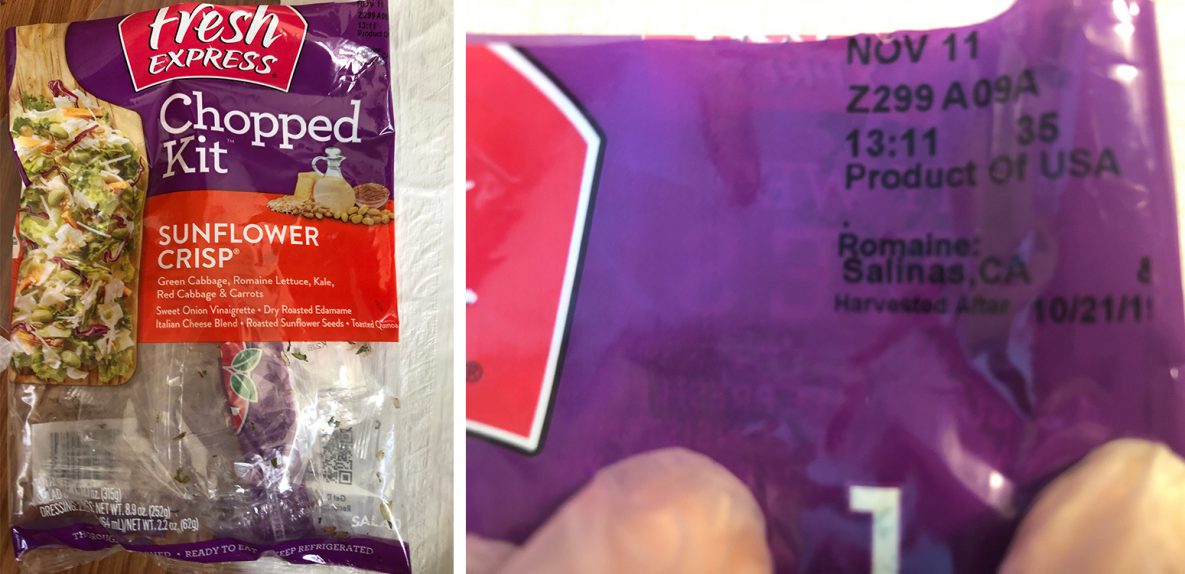Deerfield-News.com-Deerfield Beach, Fl-From www.cdc.gov –
Outbreak of E. coli Infections Linked to Fresh Express Sunflower Crisp Chopped Salad Kits

Posted on December 9, 2019 at 6:45 PM ET
CDC, public health and regulatory officials in several states and Canada, and the U.S. Food and Drug Administration (FDA) are investigating a multistate outbreak of E. coli O157:H7 infections linked to Fresh Express Sunflower Crisp chopped salad kit.

- Reported Cases: 8
- States: 3
- Hospitalizations: 3
- Deaths: 0
- Recall: No

Do not eat or sell Fresh Express Sunflower Crisp Chopped Salad Kits with this identifying information: UPC 0 71279 30906 4, beginning with lot code Z, and a best-before date up to and including 07DEC19. This information is printed on the front of the bag in the top right corner.
- Check your fridge for this salad kit.
- Don’t eat it. Throw it away.
- Even if some of the kit was eaten and no one got sick, throw the rest away.
- Wash and sanitize drawers or shelves in refrigerators where the salad kit was stored. Follow these five steps to clean your refrigerator.
- Retailers and restaurants should not sell or serve this salad kit.
Take action if you have symptoms of an E. coli infection.
- Talk to your healthcare provider.
- Write down what you ate in the week before you started to get sick.
- Report your illness to your local health department.
- Assist public health investigators by answering questions about your illness.
- Wash your hands thoroughly after changing diapers, using the toilet, and before and after preparing food to lower the chance of infecting others.

- Eight people infected with the outbreak strain of E. coli O157:H7 have been reported from three states.
- Three people have been hospitalized. One person has developed hemolytic uremic syndrome, a type of kidney failure. No deaths have been reported.
- Information collected to date indicates that Fresh Express Sunflower Crisp chopped salad kits are a likely source of this outbreak.
- The investigation is ongoing to determine what ingredient in the salad kit was contaminated.
- Romaine lettuce is one of the ingredients in the salad kit, but we do not know yet if this outbreak is related to a current outbreak linked to romaine lettuce from the Salinas, California, growing region.
- CDC will provide more information as it becomes available.

- People usually get sick from Shiga toxin-producing E. coli (STEC) 2 to 8 days (average of 3 to 4 days) after swallowing the germ.
- Some people with E. coli infections may get a type of kidney failure called hemolytic uremic syndrome (HUS).
- E. coli infection is usually diagnosed by testing a stool sample.
- Antibiotics are not recommended for patients with suspected E. coli infections until diagnostic testing can be performed and E. coli infection is ruled out. Some studies have shown that administering antibiotics to patients with E. coli infections might increase their risk of developing HUS, and a benefit of treatment with antibiotics has not been clearly demonstrated.
- For more information, see Symptoms of E. coli Infection.
December 9, 2019
CDC, public health and regulatory officials in several states, and FDA are investigating a multistate outbreak of Shiga toxin-producing E. coli O157:H7 infections. This investigation includes illnesses in Canada recently reported by the Public Health Agency of Canadaexternal icon. This outbreak is caused by a different strain of E. coli O157:H7 than the current outbreak linked to romaine lettuce from the Salinas, California, growing region.
Public health investigators are using the PulseNet system to identify illnesses that may be part of this outbreak. PulseNet is the national subtyping network of public health and food regulatory agency laboratories coordinated by CDC. DNA fingerprinting is performed on E. coli bacteria isolated from ill people by using a standardized laboratory and data analysis method called whole genome sequencing (WGS). CDC PulseNet manages a national database of these sequences that are used to identify possible outbreaks. WGS gives investigators detailed information about the bacteria causing illness. In this investigation, WGS showed that bacteria isolated from ill people in the United States and Canada are closely related genetically. This means that people in this outbreak are more likely to share a common source of infection.
As of December 9, 2019, a total of eight people infected with the outbreak strain of E. coli O157:H7 have been reported from three states. A list of the states and the number of cases in each can be found on the Map of Reported Cases page.
Illnesses started on dates ranging from November 5, 2019, to November 15, 2019. Ill people range in age from 21 to 91, with a median age of 32. Among ill people, 63% are female. Three of the eight ill people have been hospitalized, including one person who developed hemolytic uremic syndrome, a type of kidney failure. No deaths have been reported.
Investigation of the Outbreak
Information collected to date indicates that Fresh Express Sunflower Crisp chopped salad kits are a likely source of this outbreak.
State and local public health officials are interviewing ill people to determine what they ate and other exposures in the week before their illness started. Of seven ill people with information available, all seven (100%) reported eating any leafy green in the week before their illness started. Six ill people reported eating or maybe eating a Fresh Express Sunflower Crisp chopped salad kit.
The investigation is ongoing to determine which ingredient in the salad was contaminated. Romaine lettuce is one of the ingredients in the salad kit, but we do not know yet if this outbreak is related to a current outbreak linked to romaine lettuce from the Salinas, California, growing region. Preliminary information indicates that romaine lettuce in the salad kits eaten by some of the sick people likely came from the Salinas growing region. CDC is concerned that these kits may still be in some homes. If you have any of these salad kits in your home, throw them away.
CDC will provide more information as it becomes available.






























